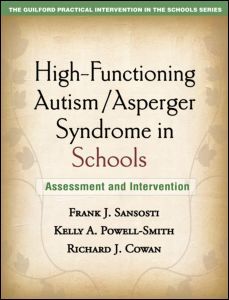Description
High-Functioning Autism/Asperger Syndrome in Schools
Assessment and Intervention
The Guilford Practical Intervention in the Schools Series
Authors: Sansosti Frank J., Powell-Smith Kelly A., Cowan Richard J.
Language: English
Subject for High-Functioning Autism/Asperger Syndrome in Schools:
51.36 €
In Print (Delivery period: 15 days).
Add to cart· 20.3x26.7 cm · Paperback
Description
/li>Contents
/li>Readership
/li>Biography
/li>Comment
/li>
Meeting a growing need for school-based practitioners, this book provides vital tools for improving the academic, behavioral, and social outcomes of students with high-functioning autism or Asperger syndrome (HFA/AS). Research-based best practices are presented for conducting meaningful assessments; collaborating with teachers, students, and parents to prevent school difficulties and problem solve when they occur; and developing effective individualized education programs (IEPs). In a large-size format to facilitate photocopying, the book features a wealth of practical prevention and intervention strategies, illustrated with concrete examples. Over a dozen reproducibles include interview forms and observation sheets.
This book is in The Guilford Practical Intervention in the Schools Series, edited by Sandra M. Chafouleas.
1. Introduction: What Is High-Functioning Autism/Asperger Syndrome?
2. Areas of Impairment
3. Consultation and Collaboration Efforts
4. Conducting a Comprehensive Assessment
5. Improving Academic Skills
6. Providing Behavioral Supports
7. Enhancing Social Skills
8. Using the Individualized Education Program as a Vehicle for Problem-Solving Service Delivery
9. Collecting Data, Evaluating Outcomes, and Ensuring Success
Appendix. Reproducible Forms
Frank J. Sansosti, PhD, NCSP, is Assistant Professor in the School Psychology Program at Kent State University. He has extensive experience working with individuals with autism spectrum disorders (ASD) in both school and clinic settings. Previously, Dr. Sansosti worked as a school psychologist and district-level autism consultant in West Central Florida. His primary research and professional interests focus on the development and implementation of behavioral and social skills interventions for young children with ASD, best-practice approaches for the inclusion of students with low-incidence disabilities, and response to intervention. He is an active workshop presenter and a consultant to multiple school districts.
Kelly A. Powell-Smith, PhD, NCSP, is a senior research scientist with Dynamic Measurement Group. Formerly, she was Associate Professor of School Psychology at the University of South Florida. Dr. Powell-Smith’s research interests include using formative assessment data within a problem-solving model for educational decision making, development of early literacy skills, procedures for and outcomes of reintegration, and service delivery to low-incidence populations, including children with Asperger syndrome. She has provided formal technical assistance and/or training related to the use of formative assessment and academic interventions in 16 states and in Canada, and has led over 150 workshops and presentations.
Richard J. Cowan, PhD, NCSP, is Associate Professor and Coordinator in the School Psychology Program at Kent State University. He has been a leader in a number of research projects and publications, presentations, and grants focusing on autism and positive behavior supports. His primary line of inquiry focuses on the development, implementation, and evaluation of academic and behavioral programs for children with ASD. His research and clinical interests also encompass the implementation and evaluation of positive beh




